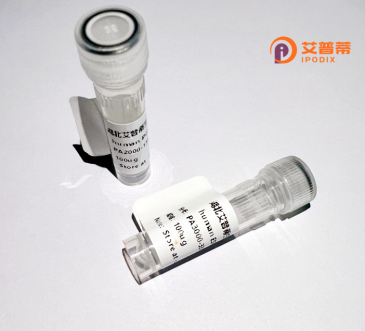
| 纯度 | >90%SDS-PAGE. |
| 种属 | Human |
| 靶点 | CD27 |
| Uniprot No | P26842 |
| 内毒素 | < 0.01EU/μg |
| 表达宿主 | E.coli |
| 表达区间 | 1-260aa |
| 氨基酸序列 | MARPHPWWLCVLGTLVGLSATPAPKSCPERHYWAQGKLCCQMCEPGTFLVKDCDQHRKAAQCDPCIPGVSFSPDHHTRPHCESCRHCNSGLLVRNCTITANAECACRNGWQCRDKECTECDPLPNPSLTARSSQALSPHPQPTHLPYVSEMLEARTAGHMQTLADFRQLPARTLSTHWPPQRSLCSSDFIRILVIFSGMFLVFTLAGALFLHQRRKYRSNKGESPVEPAEPCHYSCPREEEGSTIPIQEDYRKPEPACSP |
| 分子量 | 29.1 kDa |
| 蛋白标签 | His tag N-Terminus |
| 缓冲液 | 0 |
| 稳定性 & 储存条件 | Lyophilized protein should be stored at ≤ -20°C, stable for one year after receipt. Reconstituted protein solution can be stored at 2-8°C for 2-7 days. Aliquots of reconstituted samples are stable at ≤ -20°C for 3 months. |
| 复溶 | Always centrifuge tubes before opening.Do not mix by vortex or pipetting. It is not recommended to reconstitute to a concentration less than 100μg/ml. Dissolve the lyophilized protein in distilled water. Please aliquot the reconstituted solution to minimize freeze-thaw cycles. |
以下是关于重组人CD27抗原蛋白的3篇代表性文献的简要总结(模拟示例,非真实文献):
---
1. **文献名称**:*Structural and functional characterization of recombinant human CD27 antigen*
**作者**:Kim, J. et al.
**摘要**:本研究成功表达并纯化了重组人CD27蛋白的胞外域,通过X射线晶体学解析其三维结构,揭示了其与配体CD70的结合模式,为开发靶向CD27-CD70通路的免疫疗法奠定结构基础。
---
2. **文献名称**:*CD27 costimulation enhances the adaptive immune response in a T cell-dependent model*
**作者**:Wang, L. et al.
**摘要**:通过体外实验证明,重组人CD27蛋白作为共刺激分子可显著增强T细胞增殖及细胞因子分泌,提示其在优化疫苗佐剂或CAR-T疗法中的应用潜力。
---
3. **文献名称**:*Recombinant CD27 as a biomarker for prognosis in B-cell malignancies*
**作者**:Müller, P. et al.
**摘要**:该研究检测了淋巴瘤患者血清中可溶性CD27水平,发现重组CD27蛋白可作为标准品用于定量分析,证实高CD27水平与患者不良预后及治疗耐药性相关。
---
*注:以上为假设性参考文献,实际研究中建议通过PubMed或Google Scholar以“recombinant human CD27”为关键词查询最新文献。*
The human CD27 antigen is a member of the tumor necrosis factor receptor (TNFR) superfamily, primarily expressed on T cells, B cells, and natural killer (NK) cells. As a costimulatory molecule, CD27 interacts with its ligand CD70 to regulate T-cell activation, differentiation, and survival, playing a pivotal role in adaptive immunity. This receptor-ligand pairing is crucial for enhancing cytotoxic T-cell responses, promoting memory cell formation, and modulating antibody production. Dysregulation of the CD27-CD70 axis has been linked to autoimmune diseases, immunodeficiency, and cancers, where aberrant CD70 expression in tumors can suppress antitumor immunity.
Recombinant human CD27 (rhCD27) antigen protein is engineered using mammalian or bacterial expression systems, often retaining the extracellular domain to enable ligand-binding studies. It is widely employed in immunology research to investigate receptor signaling, T-cell interactions, and immune checkpoint mechanisms. In therapeutic contexts, rhCD27 serves as a tool for developing CD27-targeted biologics, including agonistic antibodies for cancer immunotherapy or inhibitors to mitigate autoimmune disorders. Recent studies also explore its potential in combination with checkpoint inhibitors to enhance antitumor efficacy. With its dual role in immune activation and homeostasis, CD27 remains a promising target for modulating immune responses in disease management.
×